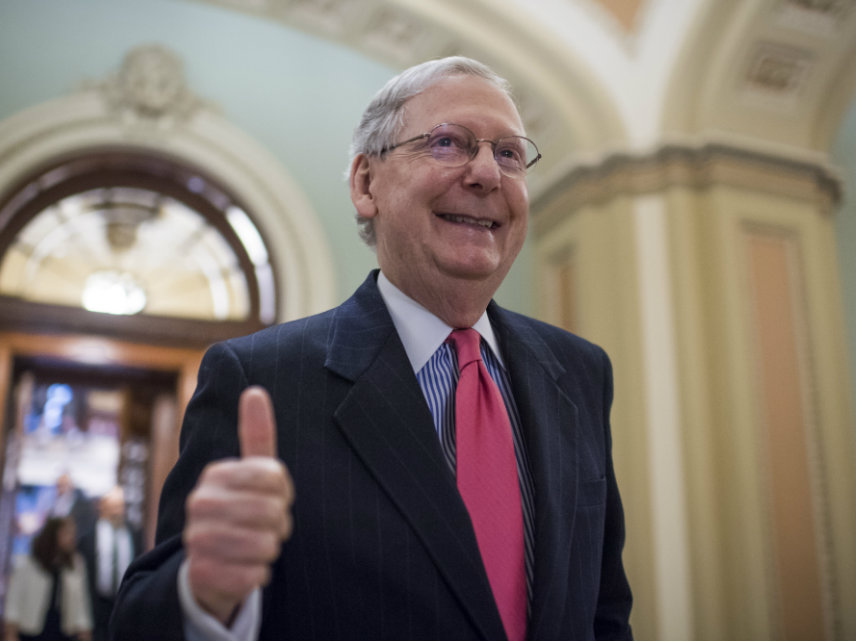The Government Shutdown Is Over for Now
Another shutdown looms in three weeks.

Senate Democrats supplied the necessary votes to reopen the federal government after striking a temporary deal with Senate Majority Leader Mitch McConnell (R-Ky.), according to multiple media reports this afternoon.
McConnell, speaking on the Senate floor Monday morning, promised to have a "fair" debate on an immigration bill with an open amendment process as long as Democrats voted to re-open the government by helping Republicans pass a continuing resolution (CR). The CR bill passed with an 82–18 vote in the Senate shortly after noon.
Democrats had withheld their support last week in order to force a settlement on the so-called "DREAMers," immigrants who entered the country illegally as children and were given special status by the Obama administration with the Deferred Action for Childhood Arrivals (DACA) policy. Those individuals could be deported beginning in mid-March, unless Congress or the White House extend the protections included in the DACA bill, something President Donald Trump has said he will not do.
Senate Minority Leader Chuck Schumer (D-N.Y.) accepted that deal, which will keep the government open for another three weeks. Significantly, the more progressive wing of the Democratic caucus—including Sens. Elizabeth Warren (D-Mass.) and Bernie Sanders (I-Vt.)—largely voted against the CR on the Senate floor Monday.
FINAL LIST of Senate Dems who just voted against reopening the govt without protections for DREAMers: Blumenthal, Booker, Cortez Masto, Feinstein, Gillibrand, Harris, Hirono, Leahy, Markey, Menendez, Merkley, Murphy, Sanders, Tester, Warren, Wyden
— Jennifer Bendery (@jbendery) January 22, 2018
Monday's action starts the clock ticking on the next shutdown, which could happen February 8 if no deal is reached on immigration and several other issues. Republicans are seeking to lift spending caps on order to pump more money into the Pentagon, Trump wants funding for his border wall, and Democrats want a path to citizenship for the DREAMers.
In other words, the fundamental disagreements that led to this shutdown have not been resolved in any meaningful way.
Even if McConnell allows an immigration bill to reach the Senate floor, right-wing opposition to even the most basic immigration reforms—here's where we remind you that more than 80 percent of Americans say the DREAMers should be allowed to become U.S. citizens—could sink the effort, either in the Senate or in the House. If that happens, Democrats could use their leverage to force another shutdown.
Congressional dysfunction remains high. We're no closer to having an actual federal budget. Republicans are determined to increase spending, even if that requires devising ways to ignore or abolish spending caps they helped implement in the Obama years. The three-week CR is laughably short. This isn't governing from crisis to crisis so much as it's governing from paycheck to paycheck in the midst of a never-ending crisis.
Complicating matters is the fact that no one seems to know what Trump wants out of a potential long-term deal—including, possibly, Trump himself. The president has flip-flopped on DACA several times since taking office, and he may have torpedoed a bipartisan immigration deal with his remark about "shithole countries" two weeks ago. Trump was largely silent, except for a few tweets, during the three-day shutdown; it's hard to imagine how Republicans will walk an incredibly thin tightrope on immigration policy without guidance and political cover from the White House.
The Panda Cam is on for now, but don't get too attached to it.


Show Comments (126)